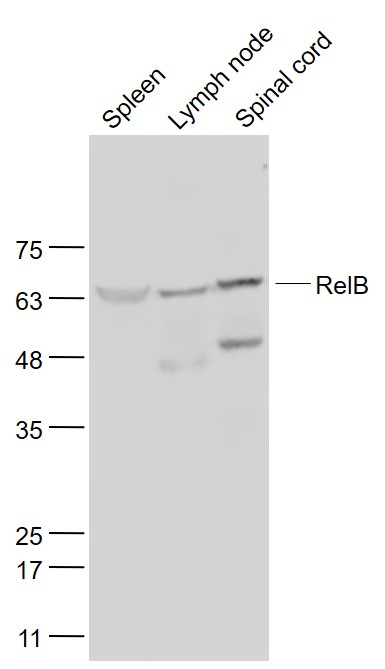
Rabbit Anti-RelB antibody
Rel B; I REL; IREL; Nuclear factor of kappa light polypeptide gene enhancer in B cells 3; RelB; Reticuloendotheliosis viral oncogene homolog B; Transcription factor RelB; v rel avian reticuloendotheliosis viral oncogene homolog; v rel reticuloendotheliosi
View History [Clear]
Details
Product Name RelB Chinese Name 核转录因子NFKB-RelB蛋白抗体 Alias Rel B; I REL; IREL; Nuclear factor of kappa light polypeptide gene enhancer in B cells 3; RelB; Reticuloendotheliosis viral oncogene homolog B; Transcription factor RelB; v rel avian reticuloendotheliosis viral oncogene homolog; v rel reticuloendotheliosis viral oncogene homolog B; RELB_HUMAN; I-Rel. literatures Research Area Tumour immunology Signal transduction Apoptosis transcriptional regulatory factor Immunogen Species Rabbit Clonality Polyclonal React Species Human, Mouse, (predicted: Rat, Rabbit, ) Applications WB=1:500-2000 ELISA=1:5000-10000 IHC-P=1:100-500 IHC-F=1:100-500 IF=1:100-500 (Paraffin sections need antigen repair)
not yet tested in other applications.
optimal dilutions/concentrations should be determined by the end user.Theoretical molecular weight 64kDa Cellular localization The nucleus cytoplasmic Form Liquid Concentration 1mg/ml immunogen KLH conjugated synthetic peptide derived from human RelB: 401-500/579 Lsotype IgG Purification affinity purified by Protein A Buffer Solution 0.01M TBS(pH7.4) with 1% BSA, 0.03% Proclin300 and 50% Glycerol. Storage Shipped at 4℃. Store at -20 °C for one year. Avoid repeated freeze/thaw cycles. Attention This product as supplied is intended for research use only, not for use in human, therapeutic or diagnostic applications. PubMed PubMed Product Detail The NFKB complex consists of NFKB1 or NFKB2 bound to REL, RELA, or RELB. The NFKB complex is inhibited by I kappa B proteins (NFKBIA, or NFKBIB), which inactivate NF kappa B by trapping it in the cytoplasm. Phosphorylation of serine residues on the I kappa B proteins by kinases (IKBKA, or IKBKB,) marks them for destruction via the ubiquitination pathway, thereby allowing activation of the NF kappa B complex. For some genes, activation requires NFKB interaction with other transcription factors, such as STAT, AP1 (JUN), and NFAT.
Function:
NF-kappa-B is a pleiotropic transcription factor which is present in almost all cell types and is involved in many biological processed such as inflammation, immunity, differentiation, cell growth, tumorigenesis and apoptosis. NF-kappa-B is a homo- or heterodimeric complex formed by the Rel-like domain-containing proteins RELA/p65, RELB, NFKB1/p105, NFKB1/p50, REL and NFKB2/p52. The dimers bind at kappa-B sites in the DNA of their target genes and the individual dimers have distinct preferences for different kappa-B sites that they can bind with distinguishable affinity and specificity. Different dimer combinations act as transcriptional activators or repressors, respectively. NF-kappa-B is controlled by various mechanisms of post-translational modification and subcellular compartmentalization as well as by interactions with other cofactors or corepressors. NF-kappa-B complexes are held in the cytoplasm in an inactive state complexed with members of the NF-kappa-B inhibitor (I-kappa-B) family. In a conventional activation pathway, I-kappa-B is phosphorylated by I-kappa-B kinases (IKKs) in response to different activators, subsequently degraded thus liberating the active NF-kappa-B complex which translocates to the nucleus. NF-kappa-B heterodimeric RelB-p50 and RelB-p52 complexes are transcriptional activators. RELB neither associates with DNA nor with RELA/p65 or REL. Stimulates promoter activity in the presence of NFKB2/p49. As a member of the NUPR1/RELB/IER3 survival pathway, may provide pancreatic ductal adenocarcinoma with remarkable resistance to cell stress, such as starvation or gemcitabine treatment.
Subunit:
Component of the NF-kappa-B RelB-p50 complex. Component of the NF-kappa-B RelB-p52 complex. Self-associates; the interaction seems to be transient and may prevent degradation allowing for heterodimer formation with p50 or p52. Interacts with NFKB1/p50, NFKB2/p52 and NFKB2/p100. Interacts with NFKBID.
Subcellular Location:
Nucleus. Cytoplasm, cytoskeleton, centrosome. Note=Co-localizes with NEK6 in the centrosome.
Post-translational modifications:
Phosphorylation at 'Thr-103' and 'Ser-573' is followed by proteasomal degradation.
Similarity:
Contains 1 RHD (Rel-like) domain.
SWISS:
Q01201
Gene ID:
5971
Database links:Entrez Gene: 5971 Human
Omim: 604758 Human
SwissProt: Q01201 Human
Unigene: 654402 Human
Product Picture
References (0)
No References
Bought notes(bought amounts latest0)
No one bought this product
User Comment(Total0User Comment Num)
- No comment



 +86 571 56623320
+86 571 56623320
 +86 18668110335
+86 18668110335

